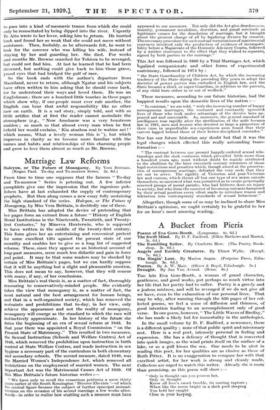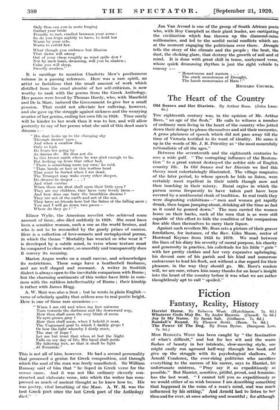A Bucket from Pieria
Poems of Eva Gore-Booth. (Longinans. 88. &I.) Tan late Eva Gore-Booth, a woman of grand character, gentleness, and good works, put perhaps so much virtue into her life that her poetry had to suffer. Poetry is a greedy and a jealous mistress, and will be revenged if we do not give all we have, even to the exhaustion of our personal lives. That may be why, after running through the 650 pages of her col- lected poems, we feel a sense of diffusion and thinness, of good intention leading to an accomplishment only of good verse. In one poem, however, " The Little Waves of Breffny," she has made a likely bid for immortality in the anthologies.
In the small volume by D. F. Radford, a newcomer, there is a different quality ; none of that public spirit and missionary zest. Here is a real poet, intensely personal in feeling and expression. She has a delicacy of thought that is converted into quick images, as the wind prints itself on the surface of a lake, or as a gull kisses the sea. One needs to be alert in reading this poet, for her qualities are as elusive as those of Ruth Pitter. It is no exaggeration to compare her with that excellent artist, for her work is strong and cleanly made. Collectors are urged to watch this writer. Already she is more than promising, as this poem will show :- " Only in thought can you possess her,
Only in thought
Know all love's sweet trouble, ite soaring rapture ; When like the moon bright in a dark pool sleeping You hold her caught_
Close in your keeping. Only thus can you in mute longing Gather your bride Proudly to rest, cradled between your arms : So do you feign nightly to have, to hold her
Warm by your side, Warm to, enfold her.
What though you embrace but illusion That dawn will sweep Out of your clasp roughly as wind spills dew ? Not by such fears, dreaming, will you be shaken ; Calm you will sleep, Sweetly awaken."
It is sacrilege to mention Charlotte Mew's posthumous volume in a passing reference. Here was a rare spirit, an artist so fastidious that the small amount of work which distilled from the cruel alembic of her self-criticism, is now worthy to rank with the poems from the Greek Anthology. Her poems were loved by Thomas Hardy, who, with Masefield and De la Mare, induced the Government to give her a small pension. That could not alleviate her suffering,- however, and she gave up the struggle against sickness and the wearying avarice of her genius, ending her own life in 1928. Time surely will be kinder to her work than it was to her, and will allow posterity to say of her poems what she said of this dead man's dreams :— " His dust looks up to the changing sky.
Through daisies' eyes ;
And when a swallow flies Only so high He hears her going by As daisies do. He does not die In this brown earth where he was glad enough to lie.
But looking up from that other bed, ' There is something more my own,' he said, ' Than hands or feet. or this restless head That must be buried when I am dead.
The Trumpet may wake every other sleeper.
Do dreams lie deeper . . .
And what sunrise When these are shut shall open their little eyes ?
They are my children, they have very lovely faces—
And how does one bury the breathless dreams ?
They are not of the earth and not of the sea,
They have no friends here but the flakes of the falling snow ; You and I will go down two paces—
Where do they go ? ' "
Elinor Wylie, the American novelist who achieved some amount of fame, also died suddenly in 1928. She must have been a sensitive woman, such a one as the world bruises, and who is not to be reconciled by the gaudy prizes of success. Here is a collection of love-sonnets and metaphysical poems, in which the theme " Mortality has wearied us who wear it " is developed by a subtle mind, in verse whose texture must be compared to clear water, so smoothly and transparently does ft convey its meaning.
- Marion Angus works on a small canvas, and acknowledges its restrictions. These songs have a heatherbell freshness, and are well shaped and resonant. A writer in Scottish dialect is always open to the inevitable comparison with Burns ; but the charming sentiments of this writer have little in com- mon with the ruthless intellectuality of Burns ; their kinship is rather with James Hogg.
A. W. Mair was also a Scot ; but he wrote in plain English— verse of scholarly quality that seldom rose to real poetic height. Here is one of those rare occasions :— " When I am old and when my feet outworn
Turn towards the darkness and the downward way, How then shall seem the rosy blush of morn To eyes grown grey ? How then shall seem, when I behold it near, The Unguessed goal to which I darkly grope ? Or how the light whereby I dimly steer, The star of hope ? Let me but trust that when at last the Night Falls on my day of life, His hand shall guide My faltering feet, so that it shall be light At Eventide."
This is not all of him, however. He had a second personality that possessed a genius for Greek composition, and through which the soul of the man was freely manifested. Sir William Ramsay said of him that " he lisped in Greek verse for the verses came. And it was not like ordinary cleverly con- structed and elaborate verse, into which the writer has com- pressed as much of ancient thought as he knew how to. His was poetry, vital breathing of the Muse. A. W. M. was the best Greek poet since the last Greek poet of the Anthology
died."
Jan Van Mond is one of the group of South African poets who, with Roy Campbell as their giant leader, are castigating the civilization which has thrown up the diamond-mine millionaires, and led to the sordid racial conflicts which are at the moment engaging the politicians over there. Drought tells the story of the climate and the people ; the heat, the dust, the choking glare, that destroy the growth of soil and of mind. It is done with great skill in tense, unrhymed verse, whose quick drumming rhythm is just the right vehicle to convey :—
" Monotonous and austere .
The stark monotonies of Drought, The harsh monotonies of Hate ! "
RICHARD Caunun.













































 Previous page
Previous page